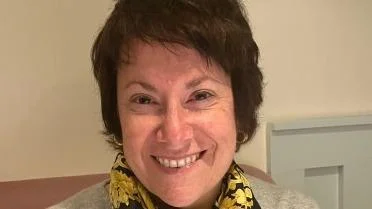Frank J Aguilar, County Board Commissioner, 16th District | Cook County Website
Frank J Aguilar, County Board Commissioner, 16th District | Cook County Website
Cook County Board of Commissioners Legislation and Intergovernmental Relations Committee met May 15
Here are the minutes provided by the committee:
ATTENDANCE
Present: Britton, Degnen, Aguilar, Anaya, Daley, Deer (remote), Gainer, Gordon, Lowry, Miller, Moore, Morita, S. Morrison, Quezada, Stamps and Trevor (16)
Absent: K. Morrison (1) excused
A motion was made by Commissioner Lowry, seconded by Commissioner Anaya, to allow for remote participation in meeting. The motion carried by the following vote:
Present: Britton, Degnen, Aguilar, Anaya, Daley, Deer (remote), Gainer, Gordon, Lowry, Miller, Moore, Morita, S. Morrison, Quezada, Stamps and Trevor (16)
Absent: K. Morrison (1) excused
PUBLIC TESTIMONY
Chairman Britton asked the Secretary to the Board to call upon the registered public speakers, in accordance with Cook County Code.
1. May Saengpraseuth Alirad - Lao-American Organization of Elgin
2. David L - Chinese American Service League
3. Sarah Tang -Coalition for a Better Chinese American Community
4. Wendy Pollack -Shriver Center on Poverty Law
5. Sam ToiaIllinois -Restaurant Association
6. Betty Marcon - Rise High Road Restaurant
7. Saru Jayamaran - One Fair Wage
8. Nataki Rhodes - One Fair Wage
9. Justin Onwenu - One Fair Wage
24-3099
COMMITTEE MINUTES
Approval of the minutes from the meeting of 04/17/2024
A motion was made by Vice Chairwoman Degnen, seconded by Commissioner Morrison, to approve 24-3099. The motion carried by the following vote:
Ayes: Britton, Degnen, Aguilar, Anaya, Daley, Deer, Gainer, Gordon, Lowry, Miller, Moore, Morita, S. Morrison, Quezada, Stamps and Trevor (16)
Absent: K. Morrison (1)
24-1179
Presented by: TONI PRECKWINKLE, President, Cook County Board of Commissioners
PROPOSED APPOINTMENT
Appointee(s): Tito Rodriguez
Position: Member
Department/Board/Commission: Des Plaines Valley Mosquito Abatement Board Effective date: 5/17/2024
Expiration date: 5/17/2028
A motion was made by Vice Chairwoman Degnen, seconded by Commissioner S. Morrison, to recommend for approval 24-1179. The motion carried by the following vote:
Ayes: Britton, Degnen, Aguilar, Anaya, Daley, Deer, Gainer, Gordon, Lowry, Miller, Moore, Morita, S. Morrison, Quezada, Stamps and Trevor (16)
Absent: K. Morrison (1)
24-2801
Presented by: TONI PRECKWINKLE, President, Cook County Board of Commissioners
PROPOSED APPOINTMENT
Appointee(s): Carol Johnson
Position: Member
Department/Board/Commission: Northwest Mosquito Abatement District
Effective date: 5/16/2024
Expiration date: 5/16/2026
A motion was made by Vice Chairwoman Degnen, seconded by Commissioner Trevor, to recommend for approval 24-2801. The motion carried by the following vote:
Ayes: Britton, Degnen, Aguilar, Anaya, Daley, Deer, Gainer, Gordon, Lowry, Miller, Moore, Morita, S. Morrison, Quezada, Stamps and Trevor (16)
Absent: K. Morrison (1)
24-2660
Sponsored by: JOSINA MORITA, FRANK J. AGUILAR, ALMA E. ANAYA, SCOTT R. BRITTON, JOHN P. DALEY, BRIDGET DEGNEN, MONICA GORDON, BILL LOWRY, DONNA MILLER, STANLEY MOORE, SEAN M. MORRISON, TONI PRECKWINKLE (President), ANTHONY J. QUEZADA, TARA S. STAMPS and MAGGIE TREVOR, Cook County Board Of Commissioners
PROPOSED RESOLUTION
RESOLUTION FOR ASIAN AMERICAN DATA INCLUSION
WHEREAS, Cook County is one of the largest and most racially, ethnically and linguistically diverse counties in the country; and
WHEREAS, Cook County Government is committed to supporting equitable, inclusive and accessible government; and
WHEREAS, Cook County Government must collect accurate data to understand and serve the specific needs of its diverse communities; and
WHEREAS, Cook County recognizes Asian Americans as a minority group; and
WHEREAS, Asian Americans include people whose origins and ancestries lie in East Asia, Southeast Asia, Pacific Islands and South Asia the Indian subcontinent; and
WHEREAS, Asian Americans come from over 40 countries, include over 20 ethnicities speaking 2,300 languages and dialects; and
WHEREAS, there were approximately 409,000 Asian American residents in Cook County representing 7.7% of the County’s population according to the 2020 US Census; and
WHEREAS, Asian Americans experienced a 28.2% population increase, the fastest highest population growth rate in Cook County between 2010 and 2020, according the US Census Bureau; and
WHEREAS, Cook County recognizes Asian Americans as a minority group; and WHEREAS, Cook County recognizes the rise in anti-Asian hate and discrimination; and
WHEREAS, Cook County does not comprehensively or consistently collect or present data on Asian Americans; and
WHEREAS, the lack of comprehensive and consistent data on Asian Americans and hinders Cook County’s ability to understand and serve these communities;
NOW, THEREFORE, BE IT RESOLVED, that all Cook County Offices Under the President research that include racial and ethnic data collection must include Asian American data collection, with ethnicity disaggregation where relevant and available; and
BE IT FURTHER RESOLVED, that all Cook County Offices Under the President Government reports and presentations that include racial and ethnic data, analysis and recommendations, must include Asian American data, with disaggregated ethnicity data, when available.
A motion was made by Vice Chairwoman Degnen, seconded by Commissioner Morita, to suspend the rules 24-2660. The motion carried by the following vote:
Ayes: Britton, Degnen, Aguilar, Anaya, Daley, Deer, Gordon, Lowry, Miller, Moore, Morita, Morrison, Quezada, Stamps and Trevor (15)
Absent: Gainer and Morrison (2)
A motion was made by Vice Chairwoman Degnen, seconded by Commissioner Gordon, to accept as amended 24-2660. The motion carried by the following vote:
Ayes: Britton, Degnen, Aguilar, Anaya, Daley, Deer, Gordon, Lowry, Miller, Moore, Morita, S. Morrison, Quezada, Stamps and Trevor (15)
Absent: Gainer and K. Morrison (2)
A motion was made by Commissioner Morita, seconded by Commissioner Degnen, to recommend for approval as amended 24-2660. The motion carried by the following vote:
Ayes: Britton, Degnen, Aguilar, Anaya, Daley, Deer, Gordon, Lowry, Miller, Moore, Morita, S. Morrison, Quezada, Stamps and Trevor (15)
Absent: Gainer and K. Morrison (2)
24-2674
Sponsored by: KEVIN B. MORRISON and SCOTT R. BRITTON, Cook County Board Of Commissioners
PROPOSED RESOLUTION
A RESOLUTION IN SUPPORT OF THE COMMUNITY SAFETY THROUGH STABLE HOMES ACT
WHEREAS, according to the Illinois Department of Human Rights (IDHR) report “Fair Housing Implications of Nuisance and Crime-Free Ordinances: A Guide for Units of Local Government”, ‘crime-free’ housing programs are formal partnerships between cities and housing providers that often require housing providers to evict tenants that are deemed connected to crimes; and
WHEREAS, the report goes on to note that these crime-free ordinances often require housing providers to deny housing, evict, fine, or penalize tenants for their connection to specific crimes or just “criminal activity” in general, and are often broadly written to prohibit activities such as the act of an arrest or simple calls for police service; and
WHEREAS, according to the ACLU of Illinois, these ordinances have been broadly written to apply even when the tenant was the victim of the crime or called the police for protection or assistance; and
WHEREAS, Illinois Public Media reports that these types of ordinances, such as one passed in the Village of Rantoul, can allow for the eviction of tenants even when the suspected criminal activity and/or calls for police service pertain to a guest of the tenant(s); and
WHEREAS, the IDHR’S report explains that crime-free housing programs often require landlords to evict tenants, utilize strict lease addendums, and conduct criminal background checks on tenants, even when these actions conflict with local human rights ordinances or other fair housing protections; and
Page 5 of 10
WHEREAS, though these ordinances are often passed with the expressed intention of deterring criminal activity on rental properties, the ACLU of Illinois reports these ordinances are disproportionately enforced against Black people and other people of color, that they harm survivors of domestic and sexual violence who seek police protection, individuals with disabilities, and others who need emergency services; and
WHEREAS, the IDHR’s report explains that by using the simple act of police contact as a trigger for evictions or other penalties against tenants, these ordinances can introduce the biases of the criminal justice system into the housing market and run the risk of furthering segregation and undermining fair housing responsibilities; and
WHEREAS, the IDHR’s report further notes that latent segregated housing patterns often facilitate over-policing so that communities of color are more likely to have repeated interactions with police; and
WHEREAS, the IDHR’s report additionally highlights that a higher percentage of racial minorities in Illinois are renters compared to white residents, and as such nuisance and crime-free ordinances may have an unlawful disparate impact; and
WHEREAS, the ACLU of Illinois also reports legal problems with these types of ordinances in that they may violate a number of legal protections including due process guarantees, federal and state prohibitions against housing discrimination, and the First Amendment right to petition the government; and
WHEREAS, the Shriver Center’s 2013 report “The Cost of Being Crime Free” further details how these ordinances can deprive tenants of due process guaranteed by the Fourteenth Amendment to the U.S. Constitution when municipalities undertake enforcement efforts that expose a tenant to the threat of being displaced from their housing without first giving the tenant notice and an opportunity to dispute the validity of these efforts; and
WHEREAS, according to the Shriver Center’s report, more than 100 municipalities in the state of Illinois alone have adopted some version of these types of ordinances, with that number expected to increase; and
WHEREAS, though Illinois enacted Public Act 99-441 (Illinois Counties and Municipal Codes) which prohibits the enforcement of these types of ‘crime-free’ ordinances in situations where police are called relating to issues of domestic and sexual violence or disability, the IDHR’s report notes that these types of ordinances run the risk of further discouraging victims of domestic violence from contacting the police in fear of losing their housing; and
WHEREAS, in a 2016 guidance report, the U.S. Department of Housing & Urban Development analyzed the adverse impact that crime-free programs have on survivors of domestic violence and found that incidents of domestic and sexual violence have been considered a nuisance or considered a violation of a crime-free program, making survivors hesitant to contact police or emergency assistance, left facing eviction, and ultimately displaced from communities; and
WHEREAS, the Shriver Center’s report further discusses how linking law enforcement’s activity at a property with the possibility of eviction of the tenants and/or penalties against the landlord, ordinances can actually deter tenants, landlords, and concerned citizens from reaching out to the police for help and/or coming to the aid of crime victims-which only serves to undermine crime reporting and public safety; and
WHEREAS, per its Diversity and Inclusion Statement, Cook County remains dedicated to equity and fairness in governance-in all its forms-to strengthen and serve our communities to the best of our abilities; and
WHEREAS, Illinois SB 3680, HB 5314, HB 5432, or The Community Safety Through Stable Homes Act, embodies this mission towards equity across the state by amending the Counties Code and the Illinois Municipal Code to prohibit local governments from requiring landlords to evict a tenant for having contact with police, a criminal conviction, or if another person in the household or guest had contact with police;
NOW, THEREFORE, BE IT RESOLVED, that the Cook County Board of Commissioners does hereby declare its support for the Illinois Legislature to pass SB 3680, HB 5314, and HB 5432, or The Community Safety Through Stable Homes Act; and
BE IT FURTHER RESOLVED, that suitable copies of this resolution be presented to the Governor of llinois, the Illinois Senate President and Minority Leader, the Illinois House Speaker and Minority Leader, and to the members of the Illinois Housing Committee, Rules Committee, and Assignments Committee.
A motion was made by Vice Chairwoman Degnen, seconded by Commissioner Daley, to recommend for deferral 24-2674. The motion carried by the following vote:
Ayes: Britton, Degnen, Aguilar, Anaya, Daley, Deer, Gainer, Gordon, Lowry, Miller, Moore, Morita, S. Morrison, Quezada, Stamps and Trevor (16)
Absent: K. Morrison (1)
24-2493
Presented by: JENNIFER KING, Executive Director, Department of Human Rights and Ethics
REPORT
Department: Human Rights and Ethics
Report Title: 2023 Ethics Annual Report
Report Period: December 1, 2022 through November 30, 2023
Summary: In accordance with Sec. 2-591(o) of the Cook County Code of Ordinances, the Cook County Board of Ethics shall prepare and publish an annual report summarizing the Board's activities and present the report to the President and the Board of Commissioners. This Annual Report covers the period of December 1, 2022 through November 30, 2023.
A motion was made by Vice Chairwoman Degnen, seconded by Commissioner Miller, to recommend for receiving and filing as amended 24-2493. The motion carried by the following vote:
Ayes: Britton, Degnen, Aguilar, Anaya, Daley, Deer, Gainer, Gordon, Lowry, Miller, Moore, Morita, S. Morrison, Quezada, Stamps and Trevor (16)
Absent: K. Morrison (1)
24-1697
Sponsored by: ANTHONY J. QUEZADA, TARA S. STAMPS, ALMA E. ANAYA, JOSINA MORITA, BRIDGET DEGNEN and FRANK J. AGUILAR, Cook County Board Of Commissioners
PROPOSED RESOLUTION
RESOLUTION IN SUPPORT OF ONE FAIR WAGE FOR WORKERS IN COOK COUNTY AND ACROSS ILLINOIS
WHEREAS, the subminimum wage impacts a Cook County workforce of almost 78,000 tipped workers, 60 percent of whom are women and 46 percent are people of color; and
WHEREAS, under the Cook County Minimum Wage Ordinance, the minimum hourly wage for adults over the age of 18 was raised to $14 for non-tipped workers per hour and $8.40 for tipped workers per hour on the 1st of January 2024; and
WHEREAS, the “two-tiered” subminimum wage system exposes tipped workers to disproportional levels of poverty, financial uncertainty, exploitation of workers under the age of 18, and sexual harassment; and
WHEREAS, according to the Bureau of Labor Statistics, an estimated 2 million people are working as restaurant servers in the United States, and roughly 70 percent of them are women; and
WHEREAS, almost 13 percent of tipped workers are in poverty, compared with approximately 6 percent of non-tipped employees, according to a 2014 joint report by the Economic Policy Institute and the Center on Wage and Employment Dynamics at the University of California, Berkeley; and
WHEREAS, income inequality due to tipped wages disproportionately impacts sole providers and their households, whom are often Black, brown, Indigenous, and women of color and single mothers; and
WHEREAS, in a study conducted by Michael Paarlberg and Teofilo Reyes, between the New York and Pennsylvania workforces along the state's border found that on aggregate, in the year following the tipped-minimum hike, those New York border counties saw workers take-home pay go up an average of 7.4 percent and employment go up 1.3 percent, compared with Pennsylvania border counties, which saw a pay increase of 2.2 percent and a decline in employment of 0.2 percent; and
WHEREAS, restaurant sales in states that have implemented One Fair Wage grew by 17 percent, according to 2017-2018 restaurant trade lobby estimates, compared to 15.6 percent in subminimum wage states; and
WHEREAS, according to restaurant trade lobby estimates, California, a state that has implemented One Fair Wage, had the highest restaurant sales in 2018 - topping over $97 billion; and
WHEREAS, a Cornell University study titled "A National Study of Human Resource Practices, Tumover Turnover, and Customer Service in the Restaurant Industry" found in evaluating 1,100 restaurant employers, employers can cut employee turnover almost in half with higher wages and better benefits due to increased morale and worker productivity; and
WHEREAS, several local and state governments, including Alaska, California, Minnesota, Nevada, Oregon, Washington state, Washington, D.C, and Wisconsin, have passed legislation that mandates that tipped workers be paid at least the same minimum wage as non-tipped employees; and
WHEREAS, Chicago recently became the largest city in the United States to independently abolish the subminimum wage for tipped workers with the passage of the One Fair Wage ordinance on October 6, 2023; and
WHEREAS, Illinois State Representative Lisa Hernandez filed House Bill 5345, and Illinois State Senator Lakesia Collins filed Senate Bill 3776 to abolish the subminimum wage for all tipped workers in Illinois, including the subminimum wage for workers under the age of 18; and
WHEREAS, Cook County works to advance economic, racial, and social justice for all people; and WHEREAS, Cook County believes all workers deserve a living wage.
NOW, THEREFORE, BE IT RESOLVED, that President Toni Preckwinkle and the Cook County Board of Commissioners celebrate the passage of the One Fair Wage ordinance in Chicago and call on the Illinois State Legislature and Governor Pritzker to work with all stakeholders to pass a One Fair Wage law and abolish the subminimum wage for tipped workers and for workers under the age of 18 in Illinois; and
BE IT FURTHER RESOLVED, that a suitable copy of this resolution be provided to Illinois Governor J.B. Pritzker, Speaker of the Illinois House of Representatives Emanuel Chris Welch, and Illinois Senate President Don Harmon....end
A motion was made by Commissioner Quezada, seconded by Commissioner Morita, to accept as amended 24-1697. The motion carried by the following vote:
Ayes: Britton, Degnen, Aguilar, Anaya, Daley, Deer, Gainer, Gordon, Lowry, Miller, Moore, Morita, Quezada, Stamps and Trevor (15)
Nayes: S. Morrison (1)
Absent: K. Morrison (1)
A motion was made by Commissioner Quezada, seconded by Vice Chairwoman Degnen, to recommend for approval 24-1697. The motion carried by the following vote:
Ayes: Britton, Degnen, Aguilar, Anaya, Daley, Deer, Gainer, Gordon, Lowry, Miller, Moore, Morita, Quezada, Stamps and Trevor (15)
Nayes: S. Morrison (1)
Absent: K. Morrison (1)
ADJOURNMENT
A motion was made by Commissioner Lowry, seconded by Commissioner Daley, to adjourn the meeting. The motion carried by the following vote:
Ayes: Britton, Degnen, Aguilar, Anaya, Daley, Deer, Gainer, Gordon, Lowry, Miller, Moore, Morita, S. Morrison, Quezada, Stamps and Trevor (16)
Absent: K. Morrison (1)
https://cook-county.legistar.com/View.ashx?M=M&ID=1193246&GUID=0F093FA3-6046-4F1C-985E-C2BCFD1D4DEA






 Alerts Sign-up
Alerts Sign-up